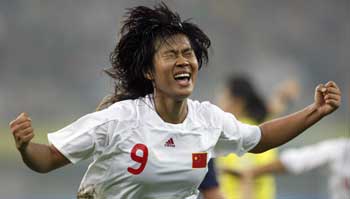
Olympics-China Media Watch: Nationalist fervor and the Olympics
Basketball star Yao Ming carried the Olympic torch through Tiananmen Square today in the triumphant final leg of a relay fraught with protest. His long-legged saunter under the gaze of Mao’s portrait captured headlines in today’s Web news outlets, along with speculation about who will light the torch at the opening ceremony of the Games on Friday. Also…
Olympics: Dark skies for Games? Maybe ‘Sunshine Government’ can clear them
Yesterday, I posted two pieces that showed how China’s good intentions toward the media can go wrong, or never get under way in the first place. The first item described a Reuters report on new guidelines that had been handed down to the police about how to handle the media if an embarrassing demonstration should…
Olympics: An Olympian Challenge? Getting There
Visas into China have been hard to get since early this year, when new policies were instituted. The tighter restrictions had already hit me in late February, when I tried to get a tourist visa to visit my wife’s family in Beijing. I was in Hong Kong to launch the 2007 edition of CPJ’s annual…
Olympics-China Media Watch: All the (good) news fit to print
All the news is excellent in China today. The Web site of Xinhua News Agency today leads by telling its audience: “Olympic dream brightens the world.” At the provincial levels, the news is equally good, but with a local angle. The Web site of the Southern media group reports that cooperation between south China’s Guangdong province…
Olympics: Police get rough in Kashgar
Police in Kashgar apparently didn’t get the message about new tactics for relating to the media. Japan’s Kyodo News Agency reported that Masami Kawakita, a photographer from the Chunichi Shimbun newspaper’s Tokyo headquarters, and Shinji Katsuta, a reporter for Nippon Television Network’s China general bureau, were slightly injured when police in Kashgar dragged them from…
Olympics: Damaging video leads to new police rules
International advocacy may have had a role in prompting the reported new rules for police in dealing with journalists covering demonstrators during the Games, but the most likely cause was the damage to China’s international image from the widespread video of cops roughing up a few Hong Kong camera crews.
Olympics: Some reporters arrive in Kashgar
Foreign journalists have started making their way to Kashgar today after the official Xinhua News Agency reported that 16 police officers were killed when two terrorists drove a truck into an electricity pole and threw two home-made explosives sometime around 8 a.m. Monday. So far, the few foreigners who have made the double-hop plane connection…
Olympics: CPJ hotline to handle press freedom issues
CPJ has set up a press freedom hotline for journalists in China covering the Olympic Games. At +852 6717 0591, the CPJ hotline will take calls in English or Mandarin from journalists facing censorship, threats, attacks, or other press freedom abuses. CPJ Asia Program Coordinator Bob Dietz, who is reporting from Hong Kong during the…
Olympics: Kashgar may be a media test
Coverage of today’s attack on a police station in Kashgar will be important to watch. The coming hours will determine if the government’s more liberal rules on foreign reporters’ travel will be observed or ignored. The policy–which ostensibly allows foreign media to travel and interview people freely–was put into place in January 2007 as part…
Olympics-China Media Watch: Terrorism in English, crime in Chinese
Information about today’s attack on border police in the western Chinese city of Kashgar is coming almost entirely from the official Xinhua News Agency. What’s interesting is the huge difference in the agency’s own reports, depending on what language you’re reading. In English, the attack was a suspected act of terrorism by Uighur separatists. In…